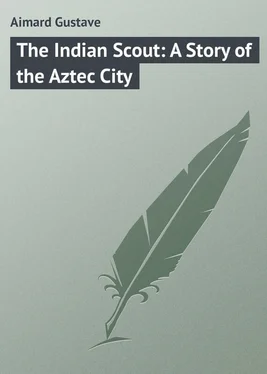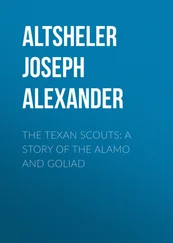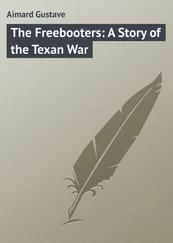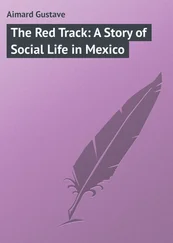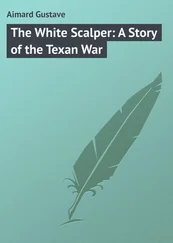Gustave Aimard - The Indian Scout - A Story of the Aztec City
Здесь есть возможность читать онлайн «Gustave Aimard - The Indian Scout - A Story of the Aztec City» — ознакомительный отрывок электронной книги совершенно бесплатно, а после прочтения отрывка купить полную версию. В некоторых случаях можно слушать аудио, скачать через торрент в формате fb2 и присутствует краткое содержание. Жанр: foreign_prose, на английском языке. Описание произведения, (предисловие) а так же отзывы посетителей доступны на портале библиотеки ЛибКат.
- Название:The Indian Scout: A Story of the Aztec City
- Автор:
- Жанр:
- Год:неизвестен
- ISBN:нет данных
- Рейтинг книги:4 / 5. Голосов: 1
-
Избранное:Добавить в избранное
- Отзывы:
-
Ваша оценка:
- 80
- 1
- 2
- 3
- 4
- 5
The Indian Scout: A Story of the Aztec City: краткое содержание, описание и аннотация
Предлагаем к чтению аннотацию, описание, краткое содержание или предисловие (зависит от того, что написал сам автор книги «The Indian Scout: A Story of the Aztec City»). Если вы не нашли необходимую информацию о книге — напишите в комментариях, мы постараемся отыскать её.
The Indian Scout: A Story of the Aztec City — читать онлайн ознакомительный отрывок
Ниже представлен текст книги, разбитый по страницам. Система сохранения места последней прочитанной страницы, позволяет с удобством читать онлайн бесплатно книгу «The Indian Scout: A Story of the Aztec City», без необходимости каждый раз заново искать на чём Вы остановились. Поставьте закладку, и сможете в любой момент перейти на страницу, на которой закончили чтение.
Интервал:
Закладка:
"Good; I expected that answer; still, it was my duty to warn you of the danger that threatened you: now, no more talking, but let us act, for time presses, and every minute we waste is an age for the man we wish to save. Walk in my moccasins; keep your eye and ear on the watch; above all, be prudent, and do nothing without orders."
After having carefully inspected the cap on his rifle, a precaution imitated by his two companions, Brighteye looked round him for a few seconds, then, with that hunter's instinct which in them is almost second sight, he advanced with a rapid though silent step in the direction of the fighting, while making the men a sign to follow him.
It is impossible to form an idea, even a distant one, of what a night march is on the prairie, on foot, through the shrubs, the trees which have grown together, the creepers that twine in every direction. Walking on a shifting soil, composed of detritus of every nature accumulated during centuries, at one place forming mounds several feet high, surrounded by deep ditches, not only is it difficult to find a path through this inextricable confusion, when walking quietly onward, with no fear of betraying one's presence, but this becomes almost impossible when you have to open a passage silently, not letting a branch spring back, or a leaf rustle; for that sound, though almost imperceptible, would be enough to place the enemy you wish to surprise on his guard.
A long residence in the desert can alone enable a man to acquire the necessary skill to carry out this rude task successfully. This skill Brighteye possessed in the highest degree; he seemed to guess the obstacles which rose at each step before him – obstacles the slightest of which, under such circumstances, would have made the most resolute man recoil, through his conviction of it being an impossibility to surmount them.
The two other hunters had only to follow the track so cleverly and laboriously made by their guide. Fortunately, the adventurers were only a short distance from the men they were going to help; had it been otherwise, they would have needed nearly the whole night to join them. Had Brighteye wished it, he could have skirted the forest and walked in the long grass – a road incomparably more easy, and especially less fatiguing; but, with his usual correctness of conception, the hunter understood that the direction he took was the only one which would permit him to go straight to the scene of action without being discovered by the Indians, who, in spite of all their sagacity, would never suspect that a man would dare to attempt such a route.
After a walk of about twenty minutes, Brighteye stopped – the hunters had arrived. On lightly moving the branches and brambles aside, they witnessed the following scene.
Before them, and scarce ten paces off, was a clearing. In the centre of that clearing three fires were burning, and were surrounded by Apache warriors, smoking gravely, while their horses, fastened to pickets, were nibbling the young tree shoots.
Marksman was standing motionless near the chiefs, leaning on his rifle, and exchanging a few words with them at intervals. Brighteye understood nothing of what he saw; all these men seemed on the best terms with the hunter, who, for his part, did not display the slightest uneasiness, either by his gestures or his face.
We have said that, after the Indians' sudden attack, Marksman advanced towards them, waving a buffalo robe in sign of peace. The Indians stopped, with that courteous deference which they display in all their relations, in order to listen to the hunter's explanations. A chief even stepped towards him, politely inviting him to say what he wanted.
"My red brother does not know me! Then, is it necessary that I should tell him my name, that he may know with whom he is speaking?" Marksman said, angrily.
"That is useless. I know that my brother is a great white warrior. My ears are open; I await the explanation he will be good enough to give me."
The hunter shrugged his shoulders disdainfully.
"Have the Apaches become cowardly or plundering coyotes, setting out in flocks to hunt on the prairies? Why have they attacked me?"
"My brother knows it."
"No, as I ask it. The Antelope Apaches had a chief – a great warrior – named Red Wolf. That chief was my friend. I had made a treaty with him. But Red Wolf is, doubtlessly, dead; his scalp adorns the lodge of a Comanche, as the young men of his tribe have come to attack me, treacherously, and against the sworn peace, during my sleep."
The Chief frowned, and drew himself up.
"The Paleface, like all his countrymen, has a viper's tongue," he said, rudely; "a skin covers his heart, and the words his chest exhales are so many perfidies. Red Wolf is not dead; his scalp does not adorn the lodge of a Comanche dog; he is still the first chief of the Antelope Apaches. The hunter knows it well, since he is speaking to him at this moment."
"I am glad that my brother has made himself known," the hunter replied, "for I should not have recognized him from his way of acting."
"Yes, there is a traitor between us," the Chief said, drily; "but that traitor is a Paleface, and not an Indian!"
"I wait till my brother explains himself. I do not understand him; a mist has spread over my eyes – my mind is veiled. The words of the Chief, I have no doubt, will dissipate this cloud."
"I hope so! Let the hunter answer with an honest tongue, and no deceit. His voice is a music which for a long time sounded pleasantly in my ears, and rejoiced my heart. I should be glad if his explanation restored me the friend whom I fancied I had lost."
"Let my brother speak. I will answer his questions."
At a sign from Red Wolf, the Apaches had kindled several fires, and formed a temporary camp. In spite of all his cleverness, doubt had entered the heart of the Apache chief, and he wished to prove to the white hunter, whom he feared, that he was acting frankly, and entertained no ill design against him. The Apaches, seeing the good understanding that apparently prevailed between their sachem and the hunter, had hastened to execute the order they received. All traces of the contest disappeared in a moment, and the clearing offered the appearance of a bivouac of peaceful hunters receiving the visit of a friend.
Marksman smiled internally at the success of his plan, and the way in which he managed, by a few words, to give quite a different turn to the position of affairs. Still he was not without anxiety about the explanation the Chief was going to ask of him. He felt he was in a wasps' nest, from which he did not know how he should contrive to emerge, without some providential accident. Redskin invited the hunter to take a seat by his side at the fire, which he declined, however, not being at all certain how matters would end, and wishing to retain a chance of escape in the event of the explanation becoming stormy.
"Is the pale hunter ready to reply?" Red Wolf asked him.
"I am awaiting my brother's good pleasure."
"Good! Let my brother open his ears, then. A Chief is about to speak."
"I am listening."
"Red Wolf is a renowned Chief. His name is cared by the Comanches, who fly before him like timid squaws. One day, at the head of his young men, Red Wolf entered an altopelt (village) of the Comanches. The Buffalo Comanches were hunting on the prairies; their warriors and young men were absent. Red Wolf burned the cabins, and carried off the women prisoners. Is that true?"
"It is true."
"Among the women was one for whom the heart of the Apache chief spoke. That woman was the Cihuatl of the sachem of the Buffalo Comanches. Red Wolf led her to his hut and treated her not as a prisoner, but as a well-beloved sister."
"What did the pale hunter?"
The Chief broke off and looked steadily at Marksman; but the latter did not move a feature.
Читать дальшеИнтервал:
Закладка:
Похожие книги на «The Indian Scout: A Story of the Aztec City»
Представляем Вашему вниманию похожие книги на «The Indian Scout: A Story of the Aztec City» списком для выбора. Мы отобрали схожую по названию и смыслу литературу в надежде предоставить читателям больше вариантов отыскать новые, интересные, ещё непрочитанные произведения.
Обсуждение, отзывы о книге «The Indian Scout: A Story of the Aztec City» и просто собственные мнения читателей. Оставьте ваши комментарии, напишите, что Вы думаете о произведении, его смысле или главных героях. Укажите что конкретно понравилось, а что нет, и почему Вы так считаете.
